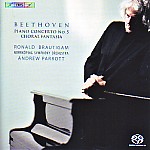This series started out with generally excellent recordings of the early concertos, and has gone steadily downhill thanks to Andrew Parrott’s systematic reduction of Beethoven’s genius to a series of generic prescriptions for “authentic” performance. In the “Emperor”, the scrawny, vibrato-less strings and fussy articulation can’t begin to muster the necessary thrust and weight to characterize the orchestral part in the outer movements, and the central Adagio sounds just plain ugly. It’s really a scandal that conductors whose sole claim on our attention is the willy-nilly application of Baroque performance theory to later periods (never mind if it’s correct in Baroque music either) enjoy careers leading modern orchestras. Of course, they make the orchestras sound “different”, which is all that matters, and here is the result.
This is all the more unfortunate because Ronald Brautigam, whether playing on period or modern instruments (as here) is an excellent soloist. He captures the scintillating virtuosity of the concerto’s outer movements effortlessly, and unlike Parrott, his phrasing and articulation never sounds merely fussy. The grand improvisation at the start of the Choral Fantasia is really impressive, his legato in the concerto’s slow movement quite lovely. And whatever Parrott’s liabilities as an orchestral leader, he’s a most able accompanist. But of course, in these mature Beethoven concertos especially, the soloist is an equal partner with the orchestra, and Brautigam’s far more characterful achievement only underlines Parrott’s failings all the more. BIS has another Beethoven concerto cycle coming, from Sudbin and Vänska, one that on past evidence promises a far more expressively meaningful level of authenticity. Stay tuned, but avoid this.
































